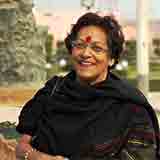Kalpanirjhar and its crusade for short films

Hunger
The Kalpanirjhar International Film Festival, held in December, began 19 years ago, founded by the Kalpanirjhar Foundation and Goethe Institut, and has continued its journey for nearly two decades under the able directorship of S.V. Raman, chaired by filmmaker Goutam Ghose and a board of eminent trustees.
This is perhaps the first international short fiction film festival in the country, with special focus on Indian films and films made by students of the Satyajit Ray Film and Television Institute of India (SRFTI) and the Film and Television Institute of India (FTII). The Indian films are competitive and there are two prestigious awards – the top award called the Patton Award went to the brilliant film Suranga directed by Mithun Chandran and produced by SRFTI, Kolkata. The Kalpanirjhar Award was bestowed on a film with the intriguing title 3C48, directed by Vamsi Telugu and produced by SRFTI.
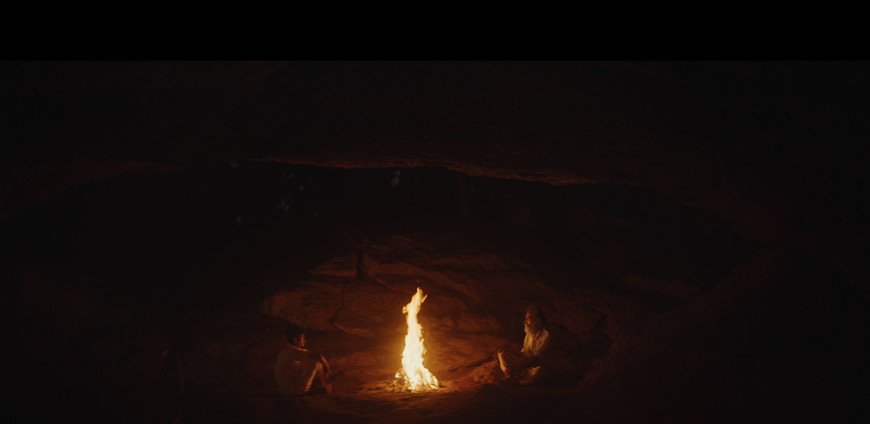 Tunnel
Tunnel
Suranga is a short film about a tunnel being dug in a remote village in Northern Kerala to extract ground water where water is the scarcest commodity, and labour needed to dig the horizontal tunnel is also scarce. Two brothers in search of work are hired by the local contractor with the promise of good money. Are they really contract labourers? They are not aware that they are being shadowed by an old man and his very young companion. Why? This forms the twist in the story, narrated against the brownish and dark backdrop of a remote location somewhere in southern India.
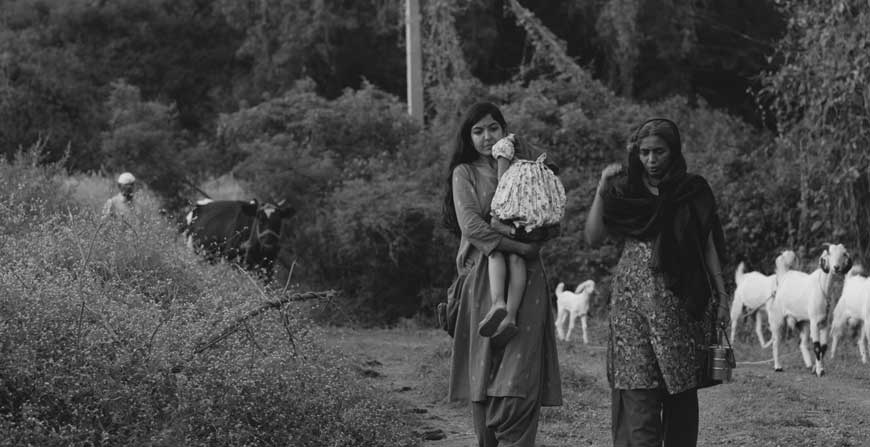 C348
C348
3C48 is a strange story about an old man Bob (72), a radio astronomer who is so obsessed with outer space that even the news of his very sick wife in hospital does not seem to shake him from his obsession. His daughter, a photo-journalist, arrives and meets the simple people of the place and begins to interact with them, trying to find common ground while the old man, estranged, isolated and alone, is left to deal with the tragedy of nostalgia juxtaposed against a little girl’s innocent conversations with the young journalist about her own perspectives on stars, birds and so on.
The three-member jury comprised Anjan Bose as chairperson, managing director of the once-celebrated Aurora Film Company, accompanied by eminent costume designer Sabarni Das and award-winning documentary filmmaker Sourav Sarangi.
The festival paid tribute to the late filmmaker Buddhadeb Dasgupta by screening his telefilm at the closing session. This happens to be one of the thirteen Tagore poems Dasgupta was commissioned to make for Doordarshan way back in 2013. This film in Hindi is an adaptation of the poem 'Istishoney' by Rabindranath Tagore. The film has a strong message about the way we judge people only by their external attributes and in the process seldom get to know the real person within. Set in a solitary station in Bihar, it tells the story of a man named Satish and his change in life and personality through the course of a single night. Aesthetically, the film offers an outstanding example of sound design capturing the mood of an empty, remote railway station The sound of trains passing over the tracks, the hooting of the engine in the distance, of crickets punching holes into the silence of the night, the sound of barking dogs complemented by the understated musical score by Alakananda Dasgupta offers a model lesson in sound design.
Also read : Seven Bengali films make it to Melbourne 2021
There were ten short fiction films in the Indian section in addition to the six short films entered by students of SRFTI. The quality of the films was mixed, but not extremely polarised. Hunger, for instance, presents the feeling of ‘hunger’ in many layers. While, on the one hand, it is real, raw and scary physical hunger expressed by an old and hungry man, on the other, it is a family waiting for the crow to come and partake in the ritual offering of rice balls for a dead relative. Director Dr. Chandrashekhar Joshi says, “Hunger is a story of a hungry man and a collage of characters that are hungry in different forms. Set in dry riverbed and harsh sunlight, the film captures the contradictory behaviour of these characters.”
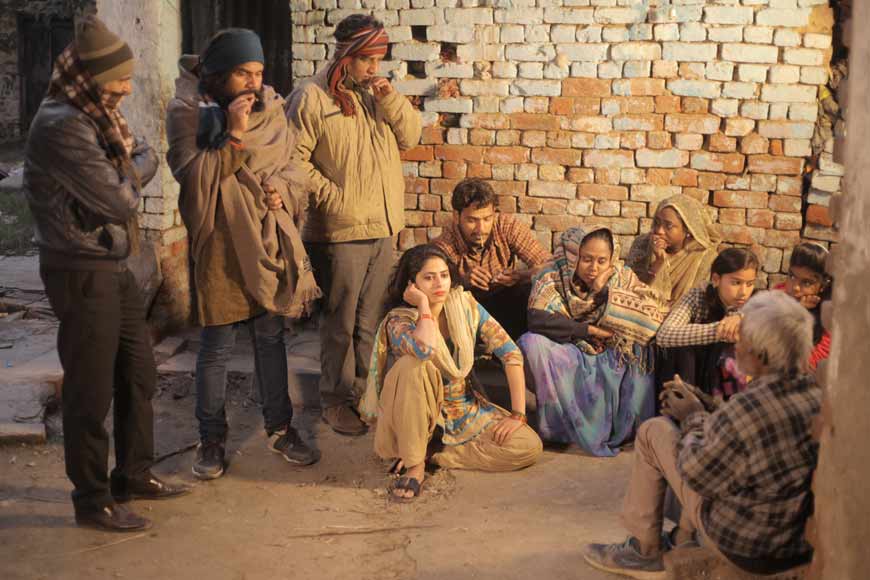 Bedsores
Bedsores
Bedsores directed by Navin Chandra Ganesh is a scary revelation of the strange practice of welcoming the birth of a female infant among the Banchhada Community of Madhya Pradesh where wives, daughters and sisters are almost organically forced into prostitution in the name of tradition. The daughters born are aware quite early that they will soon become sex workers and the jubilation on the birth of a girl has to be seen to be believed. The community is steeped in deep poverty where a sex worker is forced to ply her trade even in an advanced stage of pregnancy. They are married with families and yet the tradition continues. The technical and aesthetic treatment of the film is dark, which adds to the powerful comment on the subject.
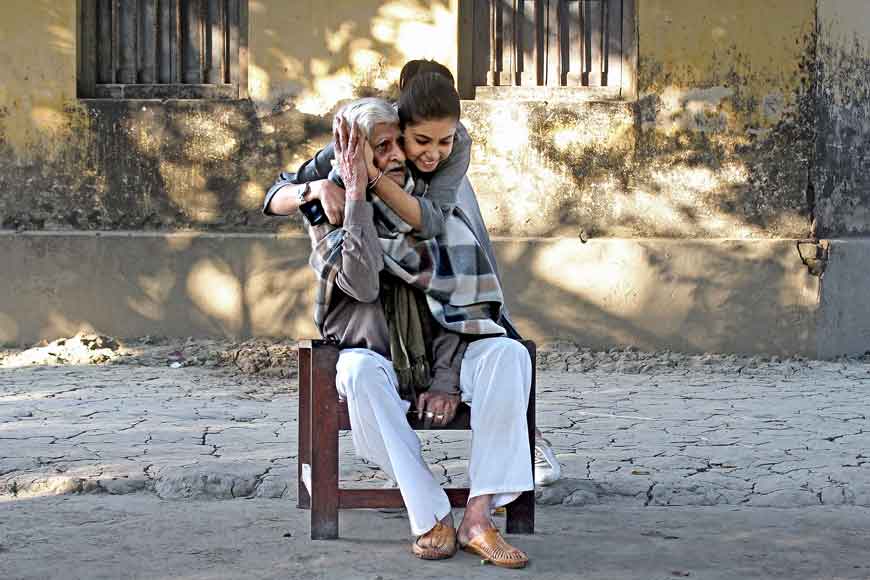 The Red Cap
The Red Cap
Red Cap by Chandradeep Das talks about an old woman who is consumed by envy of a very young couple who come to have dinner at her place and it is suggested that as a young girl, she had been subjected to sexual abuse and rape.
Santosh Ram’s Prashna throws up the extreme struggle of a small boy and his mother to get educated in the midst not only of poverty but of lack of the basic needs for education such as enough light to read and write, a permanent address, and the paucity of food, clothing and shelter.
Piklu, directed by Mrinmoy Nandy, begins very well, with an apparent focus on the average Bengali family’s casual ignorance about their mother tongue, through a little boy’s complete aversion to learning Bengali. But mid-way, the focus suddenly shifts to the boy’s highly educated tutor and his obsession with spirituality and his questions about death and the hereafter.
Safar directed by Nidhi Taneja is set against the snow-capped visuals of the extreme northern parts. But its theme is very much mainstream-friendly dealing with the slow and rocky reunion between a growing daughter and her father who left them when she was small.
Among the six SRFTI short fiction films, this writer loved Abhijeet Sarthi’s Bablu Babylon Se which is a very sharp and edgy critique on a big corporate house’s grabbing of a land filled with trees and people by felling trees and stripping the entire area of local inhabitants who are the original owners of the land. Bablu, who has been sent by his employers to capture the “seed” from the sole tree, becomes a victim of the rebellious survivors among the inhabitants.
Written and directed by Debottam Basu, Nirapad Dooratwa Bojay Rakhun (Keep safe distance) is very good fiction that deals with a multi-layered story beginning with the patriarch of a family suffering a heart attack. The journey of the patient with his two sons who are not on talking terms in an ambulance, with its driver and cleaner, comprises the entire story, which ends with an unpredictable twist. A very good film indeed.
Written and directed by Isan, A Season of Mangoes covers varied layers of the human experience but manages to bring them all together in a state of harmony and rhythm. It explores the distancing between a mango-dealer father and his son who suddenly befriends a dog which has been probably thrown out by its owners, loves his old grandmother who loves mangoes as much as she loves him, and is pained both by his separation from his father and the death of his favourite dog.
Kalpanirjhar Foundation has been carrying on this crusade of screening short fiction films from across the world and awarding the best two Indian films. Never mind the terrible ambience we are living and moving in, the movement as we all know, will go on…






